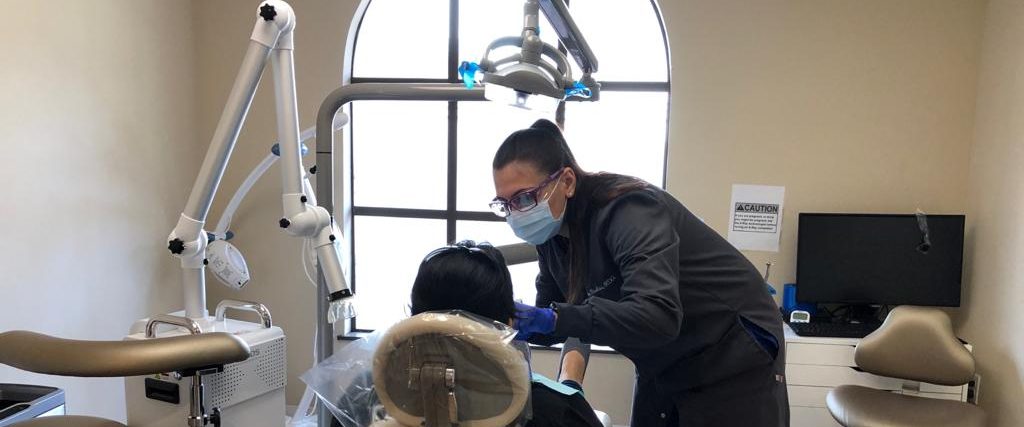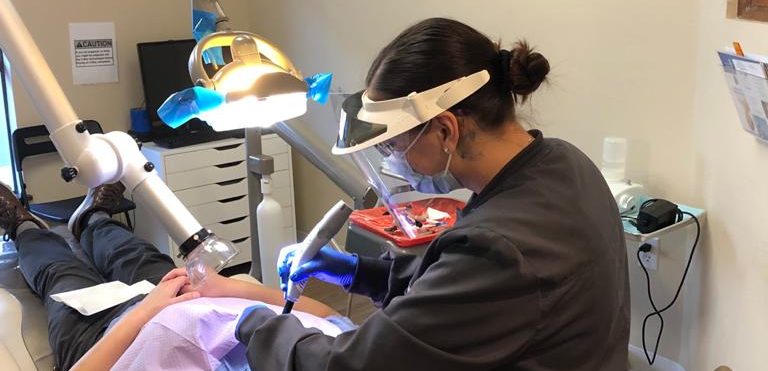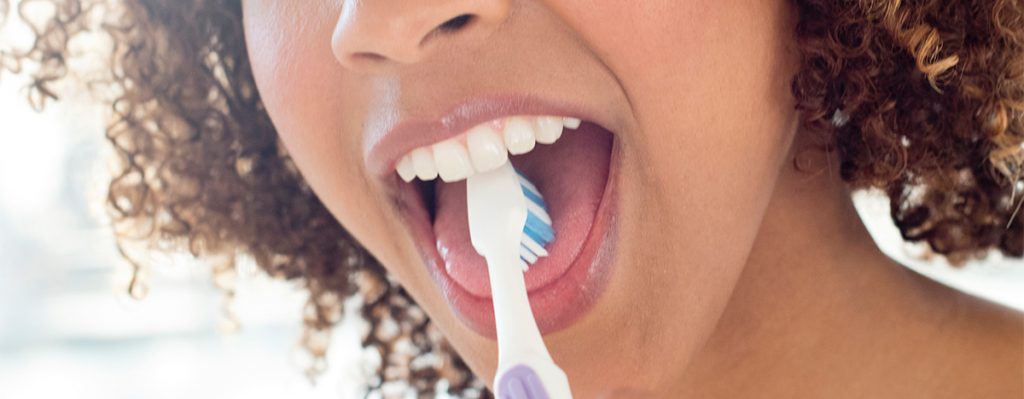Date : 01/09/2020
Dental phobia is a real thing. Approximately 75 percent of all adults suffer at least a slight fear of going to the dentist. Of those with fear, about 5 to 10 percent have a deep enough fear of dentists to be diagnosed as having dental phobia.
But what is the exact definition? How do you determine if you are merely afraid of dental procedures or if you have a much deeper fear? We’re going to explore that.
Dental anxiety is “Fear related to seeking or receiving dental care.”
Dental phobia is way beyond anxiety. In extreme cases, people will “put off the imperative dental appointments for years, and some even put up with gum infections, pain, or unsightly teeth.”
Having dental anxiety is pretty normal. As we stated, three-quarters of our population suffers at least some form of anxiety related to dental visits.
You were a kid, and your kid-brain equated pain and dentist.
As an adult, you know better, but that fear still resides in you, causing dental anxiety.
If your fear is more than anxiety, you may have dental phobia. Although more stressful, it’s not insurmountable.
Dental Phobia Is Real, and You Can Conquer It
So, you think you have an actual phobia about dental work. What do you need to do now? While you may want to hear, “Nothing, just skip the dentist, and you’ll be fine,” we can’t tell you that.
Believe it or not, dental health ties into your overall health in many ways. Seeking and following up with a dentist is important. So let’s help you through this so that you may overcome your phobia.
Here at Your Caring Dentist, we aren’t therapists or psychology experts, but we do know a few things about helping you overcome dental phobia. Also, by understanding your fear, you will be better equipped to help yourself to alleviate it.
Here’s the truth:
Dental phobia has many names such as dental anxiety, white-jacket fever, dentophobia, and many other identifiers. There is no clear-cut definition. But because dental phobia fits into several different “fear” categories, none of which involve being afraid of a person, it remains unclassified.
If you are afraid of the needles associated with dentistry, this may be stimulating your phobia. It could be a situational-based fear of the office environment due to specific smells or sounds there.
Perhaps what triggers your fear response is the fear of choking or vomiting from the procedure. The list of “things” you can be afraid of is long.
And many fears tie into dental phobia without actually allowing it to be defined.
No matter what you call it, you can cope with it. And Your Caring Dentist can help.
Understanding what is happening
Many people describe their fear of dentists as a panic attack, and it is entirely possible that you are experiencing a panic attack. Determining the parameters of your symptoms and the causes is a bit more difficult. These “triggers” need to be identified.
Once that is accomplished, you have a place to begin to conquer this genuine fear.
The dentists here at Your Caring Dentist want to work with you to help you overcome your fears. Whether you suffer from mild anxiety or complete and utter terror, we want to be there for you.
In helping you to understand your fear, we are going to ask you to keep a little mini-journal of sorts. Having a small notebook or even a page in your existing journal or day planner will work for this purpose. We’re going to ask you to write down several things:
- When the fear sets in
- How severe is the fear?
- Does it stay the same, or get worse?
- Is it constant or periodic?
- What are the symptoms you experience?
- Anything else you think might be related to the anxiety or fear
After this exercise, you will have a better understanding of your fear. You will be able to discuss this with your dental professional. You will have a ready reference of your symptoms to help relay that information to your dentist.
We understand that for some people, even speaking with your dentist can be traumatic. You are already nervous, and trying to remember everything can cause even more panic. So, keeping a mini-journal will help.
Record information about when you experience fear
The first step in conquering any fear is to understand it, determine the root cause, and examine your reaction.
Ask yourself several questions, such as:
- When does your fear start?
- Is it before you dial the phone to make your appointment?
- As soon as you receive a notice in the mail when it is time for your next check-up?
- The night before your appointment?
- Does just thinking about the dentist cause tremors through your body?
Add any other questions that you feel will help to pinpoint when you start experiencing fear reactions. That will help to establish what might be triggering your fear.
Determining when the fear begins you will also help us to evaluate the severity of your fear.
Rate your level of fear
Next, on a scale of 1 to 10, with 1 being low and 10 being high, rate the extent of your fear.
You want to track these levels from the time you make the appointment until you are sitting in the dentist’s chair.
If your fear remains pretty constant at one level throughout this period, you are more than likely experiencing anxiety. If you experience more distress increasingly as the day draws nearer, that may signify the more severe phobia.
Be honest with yourself
Next, evaluate the symptoms you are having:
- Do you experience shortness of breath or more rapid and shallow breathing?
- Does your heart feel like it is running a marathon?
- Are you light-headed or dizzy?
- Is your body temperature raising or lowering?
- Are you sweating, or cold and clammy?
- Do you feel nauseous?
The symptoms are directly related to determining whether this is anxiety or phobia also. Write down anything that is not “normal” for you.
Tracking the symptoms and rating each for the level of severity, as we discussed above is part of overcoming your fear.
Write down everything you’re feeling. Even what may not seem relevant to you. These feelings or symptoms may assist your dentist in helping you more effectively.
Discuss your dental phobia with the dentist
Regardless of what your fear response is telling you, please discuss this with your dental professionals. Talking to your dental professional is the best first step you can take toward overcoming your anxiety.
Dentists may be all about teeth, but honestly, they don’t bite.
Because dentists understand how oral health affects your overall health, they want to help you succeed. In fact, dentists spend years in school learning their trade so they can help people.
It’s true!
Immediate Steps to Calm Your Dental Phobia
First things first – BREATHE.
This is important. Some people need to concentrate on nothing except breathing for a few minutes. Take a slow, steady breath in through your mouth – one, two, three, four. Now exhale slow and steady out through your nose – one, two, three, four.
This simple breathing exercise concentrates your attention on something (counting) other than the fear. Repeat this process, and you should gradually begin to feel calmer. Some people find that closing their eyes during this breathing exercise helps.
Finding what works for you will be a process of trial and error. Some things might work the first try while others are no help at all. The key is to keep trying different techniques until you find the tools that work best for you. Then put those in your toolbox and carry them everywhere.
Another quick technique is to envision a happy place.
Close your eyes and try to picture a place where you always feel relaxed and at ease. That may be a cabin in the woods, your grandmother’s sofa, or your church. Whatever place makes you happy and relaxed.
Using your mind to overcome your mind may seem absurd, but it does work in many cases of dental anxiety. Will it work in all cases and for everyone? Perhaps not, but if you don’t try, you’ll never know, will you?
Work with your dentist to develop simple hand signals to use during your procedures. These will help your dentist know when you need a break, or when you would like something explained.
Some people like music, and wear earbuds with their favorite songs playing to calm them. Other people need a combination of different relaxation techniques. Our goal is to help you be as comfortable as possible.
When You Can’t Handle It on Your Own
You’ve tried the breathing and meditation exercises. Nothing is working to calm your anxiety.
You may need to seek professional therapy away from your dental office. Your dentist may have access to a list of service providers with a proven track record in combating dental phobia.
The most important thing for you to remember is that your fear is real, and your dentist understands this. It’s not something for you to be embarrassed about or ashamed of. Seeking help in coping with your fear is an essential first step.
Although the fear may never disappear completely, learning to combat the effects of it and loosening its grip on you is a great stride forward. Conquering it enough to allow you to seek proper dental care is vital to your whole-body health.
While we pride ourselves on working with patients to overcome anxiety and dental phobia, we are more concerned with your well-being. If taking charge of your dental phobia means the need to seek outside help or therapy, please do that.
Alternate Types of Assistance Available
While many people think of therapists as the only means of professional help available, that isn’t entirely accurate. In addition to psychological services, there are many other avenues of assistance.
Hypnosis can be successful in some cases. Although not a commonly recognized form of therapy, hypnotherapy can significantly alter your mindset when it comes to fear responses.
Meditative specialists are often able to assist people in learning techniques that can be useful when facing stressful situations. Since fear causes reactions that raise adrenalin, relaxation therapy can help to reduce that response.
Our point here is — don’t limit yourself. If your phobia is extreme, you may need extreme measures to learn how to cope with it.
The first step, though, is to discuss the matter with your dental professional. Their input may prove invaluable in finding the right tools for you.
Eye Movement Desensitization and Reprocessing (EMDR)
Some patients have undergone a form of treatment called Eye Movement Desensitization Reprocessing (EMDR) with great success.
This process was developed in 1987 by Francine Shapiro, Ph.D., a psychologist in California. It is often helpful in the treatment of Post Traumatic Stress Disorder (PTSD), anxiety, and phobias.
The therapy consists of eight defined stages:
- Reviewing history and planning treatment strategy
- Establishing trust, preparing for treatment
- Assessing negative feelings; identifying positive replacements
- Desensitization using the eye movement technique
- Strengthening positive replacements
- Evaluation to determine if you can remember the trauma without the negative emotions
- Achieving closure (the end of every session)
- Re-evaluation (the beginning of each session)
EMDR works to help you process past experiences and the emotions associated with them. The goal is to replace negative thoughts or feelings with positive feelings. This therapy encourages healthier behavior, such as allowing you to visit a dentist.
If your dental phobia is severe, your dentist or therapist may recommend this type of therapy.
Therapy and medications
In addition to seeking therapy, if needed, your dentist may provide or recommend medications to assist you with your fears.
Anxiety relieving medications such as temazepam can help ease an anxious patient. It’s a short-acting, single dose medication that can be taken once, usually about one hour before your appointment.
Sometimes this may be a sedative to relax you before your appointment. It may be nitrous oxide, also known as laughing gas, which is administered in the dental office.
Some dentists practice partial and full sedation dentistry, where you can be partially or completely asleep during your entire procedure.
When you discuss your anxiety with Your Caring Dentist, an appropriate method will be devised to assist you through the process.
Preparing Yourself for Your next Appointment
While there is an enormous amount of information available at your fingertips, sorting through it isn’t always easy.
The folks at Dental Fear Central have centralized a cache of information that is highly credible. DFC is a privately funded, independent non-profit. Since 2004, they have compiled an extensive online database of resources on anxiety, fear, and dental phobia.
Their online forum is a place where you can discuss your fear with other people just like you. You can ask questions, discuss issues, and even brag about accomplishments.
You Got This! Go Grab Your Healthy Smile
The most significant message we want to convey is that you are not alone. We at Your Caring Dentist understand your apprehension. Our entire staff dedicates themselves to making your visit as non-traumatic as possible.
Our mission is to help you work through your fear so that you can begin your journey on the road to better dental health.




